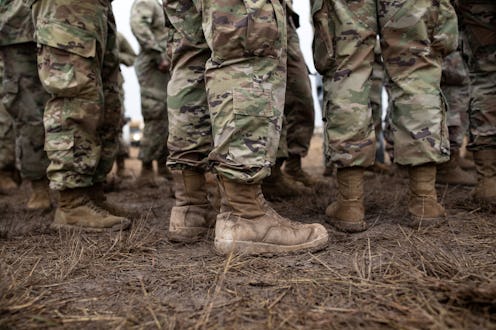
Once they are of age, men — and only men — in the United States have long been required to register for the draft. But in a decision handed down last Friday, a federal judge has said excluding women from draft registration is unconstitutional — and he pointed to an argument delivered more than two decades ago by none other than Supreme Court Justice Ruth Bader Ginsburg.
"In short, while historical restrictions on women in the military may have justified past discrimination, men and women are now 'similarly situated for purposes of a draft or registration for a draft,'" wrote Texas-based U.S. District Judge Gray H. Miller. "If there ever was a time to discuss 'the place of women in the Armed Services,' that time has passed."
In making his decision, Miller pointed to a 1996 Supreme Court case while ruled that military training facilities may not segregate men and women unless they have a convincing reason for doing so. Otherwise, those facilities, under the ruling, would be in violation of the Equal Protection Clause under the Fourteenth Amendment.
Specifically, the case dealt with the Virginia Military Institute, which, until the ruling, refused to admit women. Ginsburg delivered the majority opinion.
In her 1996 decision, she wrote that "generalizations about 'the way women are,' estimates of what is appropriate for most women, no longer justify denying opportunity to women whose talent and capacity place them outside the average description." She also argued that the women's alternative school — Virginia Women’s Institute for Leadership, which is still around today — was "a pale shadow of VMI in terms of the range of curricular choices and faculty stature, funding, prestige, alumni support and influence."
Ginsburg reflected on this landmark ruling during a visit to VMI's campus in February of 2017. She told those who attended her talk that she knew the decision "would make VMI a better place."
As for Miller's decision last Friday, its immediate ramifications are unclear. The New York Times reports that the decision, itself, was considered "declaratory," and did not specifically require that the government do anything to put it into action.
However, if the decision is upheld, USA Today reports that there are three possible outcomes: women could be required to register with the draft, the draft could be eliminated, or the draft could become entirely voluntary. It's too soon to say what might ultimately happen.
In theory, the Supreme Court had already decided whether or not women were required to register for the draft back in the 1981 case Rostker v. Goldberg. At the time, the court held that it was fair to limit the draft to men because women weren't allowed to serve in combat positions. That changed in 2015, when the Department of Defense said that women were eligible to serve in all combat-based roles, opening up more than 200,000 positions that were previously only held by men, according to the Times. And because those rules have changed, Miller argued, it is now time to reconsider how conscription is regulated in the United States.